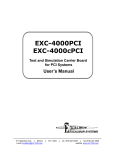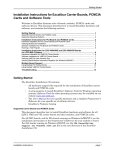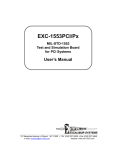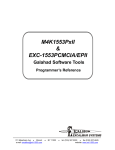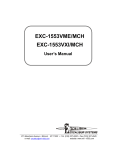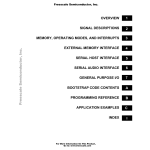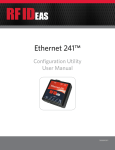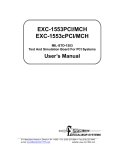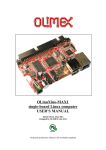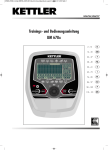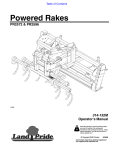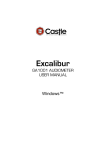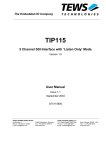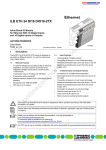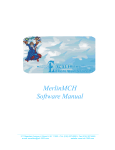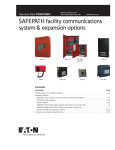Download EXC-4000VME and EXC-4000VXI User`s Manual, rev A-3
Transcript
EXC-4000VME EXC-4000VXI Test and Simulation Carrier Board for VME/VXI Systems User’s Manual 311 Meacham Avenue Elmont NY 11003 Tel. (516) 327-0000 Fax (516) 327-4645 e-mail: [email protected] website: www.mil-1553.com Table of Contents Table of Contents 1 Introduction 1.1 1.2 1.2.1 1.2.2 Overview. . . . . . . . . . . . . . . . . . . . . . . . . . . . . . . . . . . . . . . . . . . . . . . . . . . . .1-1 Installation . . . . . . . . . . . . . . . . . . . . . . . . . . . . . . . . . . . . . . . . . . . . . . . . . . .1-4 Installing the Board . . . . . . . . . . . . . . . . . . . . . . . . . . . . . . . . . . . . . . . . . . . . . . . . . . 1-4 Adding Excalibur Software Tools . . . . . . . . . . . . . . . . . . . . . . . . . . . . . . . . . . . . . . . . 1-4 2 VME/VXI Interface 2.1 2.2 2.3 2.4 2.4.1 2.4.2 2.4.3 2.4.4 2.4.5 2.4.6 2.4.7 2.4.8 2.4.9 2.4.10 2.4.11 2.4.12 VME/VXI Interface . . . . . . . . . . . . . . . . . . . . . . . . . . . . . . . . . . . . . . . . . . . . .2-2 General Memory Map . . . . . . . . . . . . . . . . . . . . . . . . . . . . . . . . . . . . . . . . . .2-2 VME/VXI Configuration Registers . . . . . . . . . . . . . . . . . . . . . . . . . . . . . . . .2-3 VME/VXI Configuration / Board Global Registers . . . . . . . . . . . . . . . . . . .2-4 VXI ID Register . . . . . . . . . . . . . . . . . . . . . . . . . . . . . . . . . . . . . . . . . . . . . . . . . . . . . 2-5 VXI Device Type Register . . . . . . . . . . . . . . . . . . . . . . . . . . . . . . . . . . . . . . . . . . . . . 2-5 VXI Status Register . . . . . . . . . . . . . . . . . . . . . . . . . . . . . . . . . . . . . . . . . . . . . . . . . . 2-6 VXI Control Register . . . . . . . . . . . . . . . . . . . . . . . . . . . . . . . . . . . . . . . . . . . . . . . . . 2-7 Using Interrupts . . . . . . . . . . . . . . . . . . . . . . . . . . . . . . . . . . . . . . . . . . . . . . . . . . . . . 2-8 VXI Offset Register . . . . . . . . . . . . . . . . . . . . . . . . . . . . . . . . . . . . . . . . . . . . . . . . . . 2-9 VXI Vector Register . . . . . . . . . . . . . . . . . . . . . . . . . . . . . . . . . . . . . . . . . . . . . . . . . 2-10 Global Board ID Register . . . . . . . . . . . . . . . . . . . . . . . . . . . . . . . . . . . . . . . . . . . . . 2-11 Global Software Reset Register. . . . . . . . . . . . . . . . . . . . . . . . . . . . . . . . . . . . . . . . 2-11 Global Interrupt Status Register. . . . . . . . . . . . . . . . . . . . . . . . . . . . . . . . . . . . . . . 2-12 Global Time Tag Clock Select Register . . . . . . . . . . . . . . . . . . . . . . . . . . . . . . . . . 2-12 Global Module Info Registers. . . . . . . . . . . . . . . . . . . . . . . . . . . . . . . . . . . . . . . . . 2-13 3 Modules Area Overview 3.1 3.2 Modules Memory Space . . . . . . . . . . . . . . . . . . . . . . . . . . . . . . . . . . . . . . . .3-1 Module Location Overview . . . . . . . . . . . . . . . . . . . . . . . . . . . . . . . . . . . . . .3-2 4 Mechanical and Electrical Specifications 4.1 4.1.1 4.1.2 4.2 4.2.1 4.2.2 4.3 4.3.1 4.3.2 4.4 4.4.1 4.4.2 4.4.3 4.5 4.5.1 4.5.2 4.6 4.7 Board Layout . . . . . . . . . . . . . . . . . . . . . . . . . . . . . . . . . . . . . . . . . . . . . . . . .4-2 EXC-4000VME Board Layout . . . . . . . . . . . . . . . . . . . . . . . . . . . . . . . . . . . . . . . . . . 4-2 EXC-4000VXI Board Layout . . . . . . . . . . . . . . . . . . . . . . . . . . . . . . . . . . . . . . . . . . . 4-3 Led Indicators . . . . . . . . . . . . . . . . . . . . . . . . . . . . . . . . . . . . . . . . . . . . . . . .4-4 EXC-4000VME LED Indicators . . . . . . . . . . . . . . . . . . . . . . . . . . . . . . . . . . . . . . . . . 4-4 EXC-4000VXI LED Indicators . . . . . . . . . . . . . . . . . . . . . . . . . . . . . . . . . . . . . . . . . . 4-5 DIP Switches . . . . . . . . . . . . . . . . . . . . . . . . . . . . . . . . . . . . . . . . . . . . . . . . .4-6 Board Logical Address DIP Switch Settings . . . . . . . . . . . . . . . . . . . . . . . . . . . . . . . 4-6 Factory Default DIP Switch Settings . . . . . . . . . . . . . . . . . . . . . . . . . . . . . . . . . . . . . 4-6 Jumpers . . . . . . . . . . . . . . . . . . . . . . . . . . . . . . . . . . . . . . . . . . . . . . . . . . . . .4-7 VME Address Space Select Jumpers . . . . . . . . . . . . . . . . . . . . . . . . . . . . . . . . . . . . 4-7 VXI MODID Connect Jumper . . . . . . . . . . . . . . . . . . . . . . . . . . . . . . . . . . . . . . . . . . . 4-7 Factory Default Jumper Settings . . . . . . . . . . . . . . . . . . . . . . . . . . . . . . . . . . . . . . . . 4-7 Connectors. . . . . . . . . . . . . . . . . . . . . . . . . . . . . . . . . . . . . . . . . . . . . . . . . . .4-8 Communications I/O Connectors [J1 and J2] . . . . . . . . . . . . . . . . . . . . . . . . . . . . . . 4-8 VME/VXI Connector J3 Pinout . . . . . . . . . . . . . . . . . . . . . . . . . . . . . . . . . . . . . . . . . 4-11 Power Requirements. . . . . . . . . . . . . . . . . . . . . . . . . . . . . . . . . . . . . . . . . .4-14 EXC-4000VXI Shield . . . . . . . . . . . . . . . . . . . . . . . . . . . . . . . . . . . . . . . . . .4-14 5 Ordering Information EXC-4000VME: User’s Manual page i Table of Contents Figures 1-1 2-1 2-2 3-1 4-1 4-2 4-3 4-4 4-5 4-6 4-7 4-8 4-9 4-10 EXC-4000VME Block Diagram . . . . . . . . . . . . . . . . . . . . . . . . . . . . . . . . . . . . . . . . . 1-3 General Memory Map . . . . . . . . . . . . . . . . . . . . . . . . . . . . . . . . . . . . . . . . . . . . . . . . 2-2 VME/VXI Configuration / Board Global Registers Block Map . . . . . . . . . . . . . . . . . . 2-4 Modules Memory Space Map . . . . . . . . . . . . . . . . . . . . . . . . . . . . . . . . . . . . . . . . . . 3-1 EXC-4000VME Board Layout . . . . . . . . . . . . . . . . . . . . . . . . . . . . . . . . . . . . . . . . . . 4-2 EXC-4000VXI Board Layout . . . . . . . . . . . . . . . . . . . . . . . . . . . . . . . . . . . . . . . . . . . 4-3 VME Front Panel . . . . . . . . . . . . . . . . . . . . . . . . . . . . . . . . . . . . . . . . . . . . . . . . . . . . 4-4 VXI Front Panel . . . . . . . . . . . . . . . . . . . . . . . . . . . . . . . . . . . . . . . . . . . . . . . . . . . . . 4-5 J1 Connector Layout Front view . . . . . . . . . . . . . . . . . . . . . . . . . . . . . . . . . . . . . . . . 4-8 J2 Connector Layout Front view . . . . . . . . . . . . . . . . . . . . . . . . . . . . . . . . . . . . . . . . 4-8 Connector J3 Pinout . . . . . . . . . . . . . . . . . . . . . . . . . . . . . . . . . . . . . . . . . . . . . . . . 4-11 Synchronization of a single EXC-4000VME board to an external system . . . . . . . 4-12 Synchronization of an external system to a single EXC-4000VME board . . . . . . . 4-13 Synchronization between EXC-4000VME Boards . . . . . . . . . . . . . . . . . . . . . . . . . 4-13 Tables 2-1 4-1 4-2 4-3 4-4 page ii Module Request Interrupt Priority . . . . . . . . . . . . . . . . . . . . . . . . . . . . . . . . . . . . . . . . 2-8 Connector P1 Pinout . . . . . . . . . . . . . . . . . . . . . . . . . . . . . . . . . . . . . . . . . . . . . . . . . . 4-9 Connector P2 Pinout . . . . . . . . . . . . . . . . . . . . . . . . . . . . . . . . . . . . . . . . . . . . . . . . . 4-10 J3 Connector Pinout . . . . . . . . . . . . . . . . . . . . . . . . . . . . . . . . . . . . . . . . . . . . . . . . . 4-11 External Signals description [Connector J3] . . . . . . . . . . . . . . . . . . . . . . . . . . . . . . . 4-12 Excalibur Systems Chapter 1 1 Introduction Introduction This User’s Manual supports both the EXC-4000VME and the EXC-4000VXI carrier boards. Unless otherwise indicated all references to the EXC-4000VME apply also to the EXC-4000VXI board. For mechanical and electrical differences between the EXC-4000VME and EXC-4000VXI boards, see Chapter 4 Mechanical and Electrical Specifications. 1.1 1.2 1.2.1 1.2.2 1.1 Overview . . . . . . . . . . . . . . . . . . . . . . . . . . . . . . . . . . . . . . . . . . . . . . . . . . . . . . . . . . .1-1 Installation. . . . . . . . . . . . . . . . . . . . . . . . . . . . . . . . . . . . . . . . . . . . . . . . . . . . . . . . . .1-4 Installing the Board. . . . . . . . . . . . . . . . . . . . . . . . . . . . . . . . . . . . . . . . . . . . . . . . . . . . . . . . . . 1-4 Adding Excalibur Software Tools . . . . . . . . . . . . . . . . . . . . . . . . . . . . . . . . . . . . . . . . . . . . . . . 1-4 Overview The EXC-4000VME is a multimode, multiprotocol VME/VXI interface carrier board for avionics test and simulation applications. Each board can hold up to eight independent modules where each module can be any one of the following types: M4K1553PxII Based on our 1553Px family. This module operates as a Bus Controller, up to 32 Remote Terminals and as a Bus Monitor. Supports an Internal Concurrent Monitor in RT and BC/RT modes. M4K1553PMx Same as above M4K1553PxII-1760 Same as M4K1553PxII plus MIL-STD-1760 options M4K1553PMx-1760 Same as above M4K1553MCH Based on our 1553MCH family. This module is qualified for airborne applications. M4K429RTx Based on our ARINC 429RxTx board. This module supports either five or ten ARINC 429 channels each of which can be configured in real time as a receive or transmit channel. M4KDiscrete This module supports 15 input and 5 open collector output discretes. The module supports TTL (0 to 5 volts) or avionics (0 to 32 volts) voltage levels. M4KSerial This module supports up to 4 independent channels of serial communications, each of which can be selected as RS485, RS422 or RS232. M4KH009 This double size module supports a fully functional H009 channel (CCC, multiPU, MON) and a concurrent Bus Monitor. M4KCAN This module supports up to 6 independent channels of CAN 2.0B protocol with standard and extended message frames and message identifiers. M4K708 This module supports two channels of ARINC 708/453, each one selectable as either transmit or receive M4KMMSI Up to 8 channels EBR -1553 (10 Mbps 1553 protocol using RS-485 transceiver) and 1 monitor output M4K561 ARINC 561/568/582 6-wire, 1 transmit and 1 receive channel with Standard and Extended Message Frames and Identifiers. EXC-4000VME: User’s Manual page 1 - 1 Chapter 1 Introduction Excalibur will be adding modules to those listed above, increasing the EXC-4000VME’s flexibility even further. Users may choose to populate the board with different types of modules or with multiple modules of the same type. For example, populating the board with four M4K429RT10 modules will give you forty ARINC 429 programmable channels. All modules come with Windows 9x/NT/2000/XP drivers, including source code. EXC-4000VME and VXI Board Features General Specifications EXC-4000VME B size board EXC-4000VXI C size board Supports up to 8 modules Protocols supported: ARINC-429/575 (10 channels per module) MIL-STD-1553 (Px and MCH compatible) MIL-STD-1760 Discrete I/O Serial - RS485/RS422/RS232 ARINC 561/568/582 H009 708 CAN MMSI Operating Environment Temperature: Humidity: 0° - 70°C standard temp. -40° - 85°C extended temp. 5% - 90% non-condensing Physical Characteristics Dimension Weight VME board 160mm×233.35 mm 305 g* VXI board 340mm × 233.35 mm 1.045K g* [* without modules] [Optional Rear I/O for EXC-4000VME] Host Interface VME/VXI Compliance Slave: Address - A16 & A24/A32 Data - D08 (EO), D16 Interrupts - D16/D08, ROAK Memory space occupied: 1024 Kbytes @ A24/A32 (128K per module) 64 bytes @ A16 Power Depends on configuration Software Support C Drivers with source code Mystic Windows for 429 modules Merlin+ Windows for Px modules Merlin Windows for MCH modules Exalt: Excalibur’s multiprotocol databus monitoring and analyzing application ExaltPlus: Exalt with bus activity Simulation capabilities For exact part numbers, see Chapter 5 Ordering Information. page 1 - 2 Excalibur Systems Chapter 1 Introduction EXC-4000VME Block Diagram The EXC-4000VME provides two 96-pin connectors (J1 and J2) for all the I/O connections. The connector’s mating part is compromised of four separate 24-pin terminal sticks, each dedicated to its module’s I/O connections. The terminal stick’s pin assignments are completely defined on the module level. An additional 8-pin connector (J3) is provided for the external signals. The EXC-4000VME contains an 8-contact Dip Switch (SW1) which provides the board’s VXI ‘Logical Address’. Local Bus Module #0 Location Module #1 Location 24 24 Module #2 Location 24 Module #3 Location 24 Module #4 Location 24 Module #5 Location 24 TS0 TS1 J1 I/O Connections TS2 TS3 VME/VXI Bus Interface LOG. ADDR. DIP SW1 Module #6 Location 24 Module #7 Location 24 TS0 TS1 J2 I/O Connections TS2 TS3 J3 Figure 1-1 External Signals EXC-4000VME Block Diagram EXC-4000VME: User’s Manual page 1 - 3 Chapter 1 1.2 Introduction Installation To operate the EXC-4000VME carrier board: 1. 2. 1.2.1 Install the board in the computer Add the Excalibur Software Tools to the hard disk Installing the Board Warning Wear a suitably grounded electrostatic discharge wrist strap whenever handling the Excalibur board and use all necessary antistatic precautionary measures. To install the EXC-4000VME: 1. 2. Note: 3. 4. 5. 1.2.2 Before installing the board it is very important to determine which 64 byte section of A16 address space is available for the board’s VME/VXI Configuration Registers. After determining this, set the SW1 DIP switch accordingly (See section 4.3 DIP Switches on page 4-6). Decide if A24 or A32 address space is to be used and set the jumper JP1 accordingly (See section 4.4 Jumpers on page 4-7). The board base address in A24 or A32 address space is set via the Offset Register. (See VXI Offset Register on page 2-9). Install and set up each module individually, as described in the module’s User’s Manual. Make certain the computer power source is disconnected. Insert the EXC-4000VME board into the VME/VXI chassis. Attach the user-constructed bus cable to the board and to the bus. The cable may be connected to and disconnected from the board while power to the computer is turned on, but not while the board is transmitting over the bus. Adding Excalibur Software Tools The standard software included with the EXC-4000VME carrier board is for Windows operating systems. Software compatible with other operating systems is available and can be downloaded from our website: www.mil-1553.com. To add Excalibur software tools drivers see the readme.pdf file on the software diskette or CD that came with your specific module. page 1 - 4 Excalibur Systems Chapter 2 2 VME/VXI Interface VME/VXI Interface Chapter 2 describes the VXI interface. The following topics are covered: 2.1 VME/VXI Interface. . . . . . . . . . . . . . . . . . . . . . . . . . . . . . . . . . . . . . . . . . . . . . . . . 2-2 2.2 General Memory Map . . . . . . . . . . . . . . . . . . . . . . . . . . . . . . . . . . . . . . . . . . . . . . 2-2 2.3 VME/VXI Configuration Registers. . . . . . . . . . . . . . . . . . . . . . . . . . . . . . . . . . . . 2-3 2.4 VME/VXI Configuration / Board Global Registers . . . . . . . . . . . . . . . . . . . . . . . 2-4 2.4.1 2.4.2 2.4.3 2.4.4 2.4.5 2.4.6 2.4.7 2.4.8 2.4.9 2.4.10 2.4.11 2.4.12 VXI ID Register . . . . . . . . . . . . . . . . . . . . . . . . . . . . . . . . . . . . . . . . . . . . . . . . . . . . . . . . . 2-5 VXI Device Type Register . . . . . . . . . . . . . . . . . . . . . . . . . . . . . . . . . . . . . . . . . . . . . . . . . 2-5 VXI Status Register . . . . . . . . . . . . . . . . . . . . . . . . . . . . . . . . . . . . . . . . . . . . . . . . . . . . . . 2-6 VXI Control Register . . . . . . . . . . . . . . . . . . . . . . . . . . . . . . . . . . . . . . . . . . . . . . . . . . . . . 2-7 Using Interrupts . . . . . . . . . . . . . . . . . . . . . . . . . . . . . . . . . . . . . . . . . . . . . . . . . . . . . . . . . 2-8 VXI Offset Register . . . . . . . . . . . . . . . . . . . . . . . . . . . . . . . . . . . . . . . . . . . . . . . . . . . . . . 2-9 VXI Vector Register . . . . . . . . . . . . . . . . . . . . . . . . . . . . . . . . . . . . . . . . . . . . . . . . . . . . . 2-10 Global Board ID Register . . . . . . . . . . . . . . . . . . . . . . . . . . . . . . . . . . . . . . . . . . . . . . . . . 2-11 Global Software Reset Register . . . . . . . . . . . . . . . . . . . . . . . . . . . . . . . . . . . . . . . . . . . 2-11 Global Interrupt Status Register . . . . . . . . . . . . . . . . . . . . . . . . . . . . . . . . . . . . . . . . . . . 2-12 Global Time Tag Clock Select Register . . . . . . . . . . . . . . . . . . . . . . . . . . . . . . . . . . . . . 2-12 Global Module Info Registers . . . . . . . . . . . . . . . . . . . . . . . . . . . . . . . . . . . . . . . . . . . . . 2-13 EXC-4000VME: User’s Manual page 2 - 1 Chapter 2 2.1 VME/VXI Interface VME/VXI Interface The EXC-4000VME complies with the following VME/VXI parameters: VME Parameters Board type: Slave Addressing: A16 and A24/A32 Data: D16, D8, (EO) Interrupts: IRQ 1-7*; D16/D08; ROAK VXI Parameters Device Class: Register based Manufacturer ID: 3924dec (F45 H) Address Space: A16/A24 or A16/A32 Required memory: 1024K; m=0011 (A24)/1011 (A32) Model code: 4000dec (FA0 H) The board interfaces to the computer via a 16-bit data bus which can be accessed in bytes or words. The board may be accessed by using address in the form: For accessing VME/VXI configuration registers: XXXX (H) (A16 mode) with address modifier codes: 29,2D For accessing 1553 storage area and configuration registers: XX XXXX (H) (A24 mode) with address modifier codes: 39, 3A, 3D, 3E or XXXX XXXX (H) 2.2 (A32mode) with address modifier codes: 09, 0A, 0D, 0E General Memory Map The board’s memory map is divided into two memory regions: • Region 1 (64 bytes) is assigned for the VXI Configuration configuration registers including the board global registers, and • Region 2 (1024 Kbytes) is assigned for module memory space. Address Space Address Region Region Assignment A16 0000 – 003F H 64 bytes VXI Configuration Registers (including Board Global Registers) A24/A32 00000 – FFFFF H 1024 Kbytes Modules Memory Space Figure 2-1 page 2 - 2 General Memory Map Excalibur Systems Chapter 2 2.3 VME/VXI Interface VME/VXI Configuration Registers The VME/VXI configuration registers are located within a 64 byte block in the A16 address space between the addresses 49152 (dec) and 65472 (dec). The base address of the configuration registers is determined by the following equation: Base Address (dec) = V*64 + 49152 (dec) V, the Logical address of the board, is an integer which varies between 0 and 255 and which the user defines via the 8-pole DIP switch, see section 4.3.1 Board Logical Address DIP Switch Settings on page 4-6. To ensure that the board operates within your system, the configuration registers must be re-initialized after power-up or after assertion of SYSRESET*. For a full explanation of the VME/VXI configuration registers and other topics relating to the operation of the VXI bus, see the VXI Bus system Specification. EXC-4000VME: User’s Manual page 2 - 3 Chapter 2 2.4 VME/VXI Interface VME/VXI Configuration / Board Global Registers The VME/VXI Configuration/Board global registers reside within the VME A16 memory space (see Figure 2-1: General Memory Map). VXI / Board Global VXI Global Figure 2-2 page 2 - 4 Register Assignment ID Register LA + 00 H Device Type Register LA + 02 H Control/Status Register LA + 04 H Offset Register LA + 06 H Reserved LA + 08 – LA + 1FH Vector Register LA + 20 H Reserved LA + 22 H – LA + 26 H Board ID Register LA + 28 H Software Reset Register LA + 2A H Interrupt Status Register LA + 2C H Time Tag Clock Select Register LA + 2E H Module 0 Info Register LA + 30 H Module 1 Info Register LA + 32 H Module 2 Info Register LA + 34 H Module 3 Info Register LA + 36 H Module 4 Info Register LA + 38 H Module 5 Info Register LA + 3A H Module 6 Info Register LA + 3C H Module 7 Info Register LA + 3E H VME/VXI Configuration / Board Global Registers Block Map Excalibur Systems Chapter 2 2.4.1 VME/VXI Interface VXI ID Register Address: LA + 00 (H) Read only The contents of this 16-bit register provides information about the board’s configuration, as described below. . Bit Bit Name Description 14-15 Device Class: Register Based Bit 15 ‘1’ Bit 14 ‘1’ 12-13 Address Space Bit 13 ‘0’ Bit 12 ‘0’ A24 (JP1 Shorted) Bit 13 ‘0’ Bit 12 ‘1’ A32 (JP1 Open) 00-11 Manufacturer ID Set to F54 H / 3924 Dec ID Register Note: The VXI specification requires all VXI devices to identify themselves via an ID register. . 2.4.2 VXI Device Type Register Address: LA + 02 (H) Read only This 16-bit register contains a fixed Device Type Identifier as well as a 4-bit field which reflects the Required Memory Usage of the carrier board. Bit Bit Name Description 12-15 Required Memory 3 H = 1024 KB for A24 (JP1 Shorted) B H = 1024 KB for A32 (JP1 Open) 00-11 Model code Set to FA0 H [4000 Dec] VXI Device Type Register Note: The VXI specifications require the user to let the system know how much memory the device requires. This is known as the ‘m’ value in VXI parlance. EXC-4000VME: User’s Manual page 2 - 5 Chapter 2 2.4.3 VME/VXI Interface VXI Status Register Address: LA + 04 (H) Read only A read of the 16-bit register provides the information defined below. Bit Bit Name Description 15 Memory Enable The state of the Memory Enable bit in the Control Register 14 MODID* The state of the inverted value of the board’s VXI MODID line (connector P2 pin A30 and JP2 Shorted) 07-13 CB0–6 The state of the CB0–6 bits in the Control Register 06 IRQSEL2 The state of the IRQSEL2 bit in the Control Register 05 IRQSEL1 The state of the IRQSEL1 bit in the Control Register 04 IRQSEL0 The state of the IRQSEL0 bit in the Control Register 03 Ready 1 The power-up sequence was completed and the board is ready to accept commands. This bit is a logical “AND” of all installed modules’ Ready bit. 02 Passed Upon power-up: 1 The self-test was successfully completed 0 The carrier board is either executing or has failed its self-test Upon software reset: 1 During self-test 0 The carrier board failed its self-test 01 Sysfail Inhibit The state of the Sysfail Inhibit bit in the Control Register 00 Reset The State of the Reset bit in the Control Register VXI Status Register page 2 - 6 Excalibur Systems Chapter 2 2.4.4 VME/VXI Interface VXI Control Register Address: LA + 04 (H) Write only Writing to this 16-bit register causes the board to execute the actions listed below. This register is initialized to 0000 H at power-up (SYSRESET*). Bit Bit Name Description 15 Memory Enable 1 07-14 CB0–7 Configuration bits – Reserved 04-06 IRQSEL0-2 Writing to these bits selects which one of the VME bus Interrupt Request lines IRQ1* – IRQ7* will be driven active when the board generates an interrupt. 0 H = None 1 H = IRQ1* 2 H = IRQ2* 3 H = IRQ3* 4 H = IRQ4* 5 H = IRQ5* 6 H = IRQ6* 7 H = IRQ7* 03 Reserved set to 0 02 VECTWREN Writing a ‘1’ to this bit enables modifying the low byte value of the VXI Vector register. See VXI Vector Register, page 2-10 01 Sysfail Inhibit Reserved - set to 0 00 Reset Writing a 1 to this bit forces the board into the RESET state. You must not write a 0 into this bit for at least 100 µsec. after writing a 1 into it. That is, once in the RESET state, the board must remain in this state for at least 100 µsec. While in the RESET state the board is completely inactive and will not respond to any commands. Upon releasing the board from the RESET state (write 0 to this bit), the board will perform its self test routines. Each board’s module may also be reset via the Global Software Reset Register defined in this manual. This second method is the preferred mechanism for resetting the board. Enables access to the board’s Storage Area and Control Registers residing in A24 or A32 VME address space. 0 None of the on board registers and memory which are resident in the A24 or A32 address spaces may be accessed. The Configuration registers, of course remain accessible regardless of the state of this bit, as they reside in the A16 address space of the board. VXI Control Register EXC-4000VME: User’s Manual page 2 - 7 Chapter 2 2.4.5 VME/VXI Interface Using Interrupts The interrupt generated on the selected IRQ* line is the logical OR of the interrupt output from each of the eight modules on the board. An interrupt which was generated by one of the modules, will result in the interrupt routine whose vector resides in VXI Vector register to be executed. The board will place the value (VME STATUS/ID) stored in the VXI Vector register, onto the VME data lines when issuing the interrupt acknowledge cycle. Your processor will use this value to determine which entry in your interrupt vector table to jump to. Within this interrupt routine the actual cause of the interrupt can be determined by polling the appropriate Global Interrupt register. The interrupt request is cleared automatically at the end of the interrupt acknowledge cycle. This method is referred to in the VME specification as ROAK (Release On Acknowledge). In case of multiple pending interrupt requests the highest priority request will be cleared. After the user services this request a second interrupt will be generated for the next pending interrupt. The priorities are defined in Table 2-1: Module Request Interrupt Priority. Request Name Priority Module 0 request Highest Module 1 request Module 2 request Module 3 request Module 4 request Module 5 request Module 6 request Module 7 request Lowest Table 2-1 Module Request Interrupt Priority page 2 - 8 Excalibur Systems Chapter 2 VME/VXI Interface . 2.4.6 VXI Offset Register Address: LA + 06 (H) Write / Read This 16 bit read/write register defines the base address of the board’s A24 or A32 memory and registers. If A24 addressing is used, the 4 most significant bits of the register are the values of the 4 most significant bits of the board’s module memory space addresses and the 12 least significant bits of the register are not used. If A32 addressing is used, the Offset register represents the 12 most significant bits of the board’s module memory space addresses. Thus, Offset register bits 15 through 12 map to the address lines A23 through A20 for the A24 Address Space, and Offset register bits 15 through 04 map to address lines A31 through A20 for the A32 Address Space. A24 Mode A32 Mode Bit Description Bit Description 12-15 Offset value Base Select [23 ... 20] 04-15 Offset value Base Select [31 ... 20] 00-11 Reserved [don’t care] 00-03 Reserved [don’t care] VXI Offset Register A24 Address Example Required base address = B00000 H Write Bxxx H to Offset Register Offset Bit x = don’t care 1 0 1 1 x x x x x x x x x x x x 15 14 13 12 11 10 9 8 7 6 5 4 3 2 1 0 A23 A22 A21 A20 EXC-4000VME: User’s Manual Corresponding Address Line page 2 - 9 Chapter 2 VME/VXI Interface A32 Address Example Required base address = 6780 0000 H Write 678x H to Offset Register Offset Bit x = don’t care 0 1 1 0 0 1 1 1 1 0 0 0 x x x x 15 14 13 12 11 10 9 8 7 6 5 4 3 2 1 0 A31 A30 A29 A28 A27 A26 A25 A24 A23 A22 A21 A20 2.4.7 VXI Vector Register Address: Corresponding Address Line LA + 20 (H) Write / Read In the case of an interrupt generated by the board, the bits of this 16-bit register, known as the STATUS/ID, are used as the interrupt vector during the ensuing interrupt acknowledge cycle. The board is a D16/D08 INTERRUPTER, and as a result will place these bits on lines D00-15/D00-07 of the VME bus during the interrupt acknowledge cycle. Bit Description 08-15 Vector Hi byte Value 00-07 Vector Lo byte value VXI Vector Register – Write Operation Bit Description 08-15 Vector Hi byte Value (defaults to FF H at power up) 00-07 Either Logical Address (SW1 contacts state) if VECTWREN bit = 0 or Vector Lo byte value (defaults to SW1 state at power-up) if VECTWREN = 1 VXI Vector Register – Read or Interrupt Acknowledge Operation page 2 - 10 Excalibur Systems Chapter 2 VME/VXI Interface : 2.4.8 Global Board ID Register Address: LA + 28 (H) Read only The Global Board ID Register comprises three identification items: Bit Bit Name Description 08-15 Board ID Hard coded to value 40 H 04-07 FPGA Rev 1 = Rev 1 2 = Rev 2 3 = Rev 3 00-03 Reserved Hard coded to 0 H Global Board ID Register 2.4.9 Global Software Reset Register Address: LA + 2A (H) Write The Global Software Reset Register performs reset operations of the modules. Individual modules may be reset. Bit 08, the Global Time Tag Reset, resets all the modules Time Tag counters. Bit Bit Name Description 09-15 Reserved 08 Global Time Tag Reset Resets all the modules Time Tag counters 1 = Reset all time Tag counter 0 - No effect 07 Module 7 Software reset 1 = Reset module 0 = No effect 06 Module 6 Software reset 1 = Reset module 0 = No effect 05 Module 5 Software reset 1 = Reset module 0 = No effect 04 Module 4 Software reset 1 = Reset module 0 = No effect 03 Module 3 Software reset 1 = Reset module 0 = No effect 02 Module 2 Software reset 1 = Reset module 0 = No effect 01 Module 1 Software reset 1 = Reset module 0 = No effect 00 Module 0 Software reset 1 = Reset module 0 = No effect Global Software Reset Register EXC-4000VME: User’s Manual page 2 - 11 Chapter 2 2.4.10 VME/VXI Interface Global Interrupt Status Register Address: LA + 2C (H) Write / Read The Global Interrupt Status Register indicates which modules are currently interrupting. Each Status bit can be cleared individually by writing ‘1’ to it. Description Bit Bit Name Read Write 08-15 Reserved Set to 0 Set to 0 07 Module 7 Interrupt Status 1 = Interrupt 0 = No Interrupt 1 = Clear Status Bit 0 = No effect 06 Module 6 Interrupt Status 1 = Interrupt 0 = No Interrupt 1 = Clear Status Bit 0 = No effect 05 Module 5 Interrupt Status 1 = Interrupt 0 = No Interrupt 1 = Clear Status Bit 0 = No effect 04 Module 4 Interrupt Status 1 = Interrupt 0 = No Interrupt 1 = Clear Status Bit 0 = No effect 03 Module 3 Interrupt Status 1 = Interrupt 0 = No Interrupt 1 = Clear Status Bit 0 = No effect 02 Module 2 Interrupt Status 1 = Interrupt 0 = No Interrupt 1 = Clear Status Bit 0 = No effect 01 Module 1 Interrupt Status 1 = Interrupt 0 = No Interrupt 1 = Clear Status Bit 0 = No effect 00 Module 0 Interrupt Status 1 = Interrupt 0 = No Interrupt 1 = Clear Status Bit 0 = No effect Global Interrupt Status Register 2.4.11 Global Time Tag Clock Select Register Address: LA + 2E (H) Write / Read The Global Time Tag Clock Select Register is used to set either an internal (1 MHz) or external source for the board’s Global Time Tag Clock. See section 4.5.2.2 External Signals Descriptions [Connector J3] on page 4-12. Bit Description 03-15 Reserved – set to 0 00-02 Time Tag Clock Select 0 1-4 5 6-7 Internal source (default) Reserved External source Reserved Global Time Tag Clock Select Register page 2 - 12 Excalibur Systems Chapter 2 2.4.12 VME/VXI Interface Global Module Info Registers Address: LA + 30...3E (H) Read only The Global Module Info Registers provide identification information for each of the eight modules, respectively. Bit Description 12-15 Module ID 0 H = Module 0 Info Register (at LA + 30 H) 1 H = Module 1 Info Register (at LA + 32 H) 2 H = Module 2 Info Register (at LA + 34 H) 3 H = Module 3 Info Register (at LA + 36 H) 4 H = Module 4 Info Register (at LA + 38 H) 5 H = Module 5 Info Register (at LA + 3A H) 6 H = Module 6 Info Register (at LA + 3C H) 7 H = Module 7 Info Register (at LA + 3E H) 05-11 Reserved set to 0 00-04 Module type 01 H = M4K561 02 H = M4KSerial 03 H = M4K1553MCH 04 H = M4K429RTx 05 H = M4K1553PxII 06 H = M4KMMSI 07 H = M4K708 09 H = M4KH009 0C H = M4KCAN 0D H = M4KDiscrete 1F H = none Global Module Info Registers EXC-4000VME: User’s Manual page 2 - 13 Chapter 2 VME/VXI Interface page 2 - 14 Excalibur Systems Chapter 3 3 Modules Area Overview Modules Area Overview 3.1 3.2 3.1 Modules Memory Space. . . . . . . . . . . . . . . . . . . . . . . . . . . . . . . . . . . . . . . . . . . . . . .3-1 Module Location Overview . . . . . . . . . . . . . . . . . . . . . . . . . . . . . . . . . . . . . . . . . . . .3-2 Modules Memory Space The modules memory space is divided equally between the modules, into eight ranges of 128 Kbytes each. Range Assignment Address Range Module 0 Memory Space 00000 – 1FFFF H Module 1 Memory Space 20000 – 3FFFF H Module 2 Memory Space 40000 – 5FFFF H Module 3 Memory Space 60000 – 7FFFF H Module 4 Memory Space 80000 –9 FFFF H Module 5 Memory Space A0000 – BFFFF H Module 6 Memory Space C0000 – DFFFF H Module 7 Memory Space E0000 – FFFFF H Figure 3-1 Modules Memory Space Map When accessing the modules memory space, we recommend that you use word addressing as is the case with 16-bit control registers. When accessing 8-bit control registers, we recommend that you use byte addressing as there is a possibility of inadvertently overwriting a byte-wide register (which resides next to the desired register) when using 16-bit word addressing. All 16-bit words contained in the module’s dual-port RAM are stored in the following manner: Byte Access Address Hi Even Lo Odd Example: The module’s Stack Pointer is located at address: xxxx Hi Byte xxxx EXC-4000VME: User’s Manual Lo Byte xxxx+1 page 3 - 1 Chapter 3 3.2 Modules Area Overview Module Location Overview Each module location complies with the 125-pin Excalibur M4K series size module and is assigned a 128 Kbyte range of the carrier board’s A24/A32 memory map. Each module location provides 5 module identification lines and the following local bus dedicated signals: module reset, module chip select, module interrupt. All module locations share common address lines, data lines, a read signal, a write signal, a low enable signal, a high enable signal and a busy signal. Two additional common signals the Time Tag Clock (1 MHz) and the Time Tag Reset are intended for modules with Time Tag synchronization. Module location pairs 0/1, 2/3, 4/5, and 6/7 share 6 common lines for intermodule interfaces. For example: two M4K1553PxII modules can provide the 1553 Concurrent Monitoring feature. page 3 - 2 Excalibur Systems Chapter 4 4 Mechanical and Electrical Specifications Mechanical and Electrical Specifications Chapter 4 describes the mechanical and electrical specifications of the EXC-4000VME and EXC-4000VXI carrier boards. The topics covered are: 4.1 Board Layout . . . . . . . . . . . . . . . . . . . . . . . . . . . . . . . . . . . . . . . . . . . . . . . . . . . . . . .4-2 4.1.1 4.1.2 4.2 Led Indicators . . . . . . . . . . . . . . . . . . . . . . . . . . . . . . . . . . . . . . . . . . . . . . . . . . . . . . .4-4 4.2.1 4.2.2 4.3 Board Logical Address DIP Switch Settings . . . . . . . . . . . . . . . . . . . . . . . . . . . . . . . 4-6 Factory Default DIP Switch Settings . . . . . . . . . . . . . . . . . . . . . . . . . . . . . . . . . . . . . 4-6 Jumpers. . . . . . . . . . . . . . . . . . . . . . . . . . . . . . . . . . . . . . . . . . . . . . . . . . . . . . . . . . . .4-7 4.4.1 4.4.2 4.4.3 4.5 EXC-4000VME LED Indicators . . . . . . . . . . . . . . . . . . . . . . . . . . . . . . . . . . . . . . . . . 4-4 EXC-4000VXI LED Indicators . . . . . . . . . . . . . . . . . . . . . . . . . . . . . . . . . . . . . . . . . . 4-5 DIP Switches . . . . . . . . . . . . . . . . . . . . . . . . . . . . . . . . . . . . . . . . . . . . . . . . . . . . . . . .4-6 4.3.1 4.3.2 4.4 EXC-4000VME Board Layout . . . . . . . . . . . . . . . . . . . . . . . . . . . . . . . . . . . . . . . . . . 4-2 EXC-4000VXI Board Layout . . . . . . . . . . . . . . . . . . . . . . . . . . . . . . . . . . . . . . . . . . . 4-3 VME Address Space Select Jumpers . . . . . . . . . . . . . . . . . . . . . . . . . . . . . . . . . . . . 4-7 VXI MODID Connect Jumper . . . . . . . . . . . . . . . . . . . . . . . . . . . . . . . . . . . . . . . . . . . 4-7 Factory Default Jumper Settings . . . . . . . . . . . . . . . . . . . . . . . . . . . . . . . . . . . . . . . . 4-7 Connectors . . . . . . . . . . . . . . . . . . . . . . . . . . . . . . . . . . . . . . . . . . . . . . . . . . . . . . . . .4-8 4.5.1 4.5.1.1 4.5.1.2 4.5.2 4.5.2.1 4.5.2.2 Communications I/O Connectors [J1 and J2] . . . . . . . . . . . . . . . . . . . . . . . . . . . . . . 4-8 VME/VXI Connector P1 Pinout . . . . . . . . . . . . . . . . . . . . . . . . . . . . . . . . . . . . . . . . 4- 9 VME/VXI Connector P2 Pinout . . . . . . . . . . . . . . . . . . . . . . . . . . . . . . . . . . . . . . . 4- 10 VME/VXI Connector J3 Pinout . . . . . . . . . . . . . . . . . . . . . . . . . . . . . . . . . . . . . . . . . 4-11 J3 Pinout . . . . . . . . . . . . . . . . . . . . . . . . . . . . . . . . . . . . . . . . . . . . . . . . . . . . . . . . 4- 11 External Signals Descriptions [Connector J3] . . . . . . . . . . . . . . . . . . . . . . . . . . . . 4- 12 4.6 Power Requirements . . . . . . . . . . . . . . . . . . . . . . . . . . . . . . . . . . . . . . . . . . . . . . . .4-14 4.7 EXC-4000VXI Shield . . . . . . . . . . . . . . . . . . . . . . . . . . . . . . . . . . . . . . . . . . . . . . . . .4-14 EXC-4000VME: User’s Manual page 4 - 1 Chapter 4 Mechanical and Electrical Specifications EXC-4000VME Board Layout LD6 LD5 4.1.1 JP1 LD10 LD9 LD7 LD4 Board Layout LD8 4.1 MODULE #5 MODULE #4 P1 J2 MODULE #0 SW1 1 2 3 4 5 6 7 8 233.35 mm (9.187”) J3 MODULE #6 LD2 LD1 LD3 LD0 MODULE #7 MODULE #1 J1 P2 MODULE #3 MODULE #2 JP3 JP2 Figure 4-1 page 4 - 2 EXC-4000VME Board Layout Excalibur Systems Chapter 4 P2 EXC-4000VXI Board Layout P1 4.1.2 Mechanical and Electrical Specifications MODULE #2 MODULE #0 MODULE #3 MODULE #1 MODULE #6 MODULE #7 MODULE #4 JP1 MODULE #5 1 2 JP2 3 4 5 6 7 8 SW1 LD6 LD5 LD2LD1 LD7 LD4 LD3LD0 LD10 LD9 LD8 J3 J2 J1 JP3 233.35 mm (9.187”) Figure 4-2 EXC-4000VXI Board Layout EXC-4000VME: User’s Manual page 4 - 3 Chapter 4 Mechanical and Electrical Specifications 4.2 Led Indicators 4.2.1 EXC-4000VME LED Indicators The MODID, PASS and READY LEDs are general to the operation of the entire board. In addition there are eight PCB surface mounted RDY LEDs, one per each module. The function of each LED is listed below. LED Name Indication MODID Reflects the state of the MODID pin in the VXI bus. JP2 must be installed) This LED has no function in a VME system PASS The board passed the power-on self-test routine. Reflects the state of the same bit in the VXI Configuration Status register. READY Indicates that the board is ready for operation. Reflects the state of bit 03 of the VXI Configuration Status register. MODID PASS READY Front Panel LEDs J2 J3 J1 LED Name Indication LD0 RDY0 Module 0 ready LD1 RDY1 Module 1 ready LD2 RDY2 Module 2 ready LD3 RDY3 Module 3 ready LD4 RDY4 Module 4 ready LD5 RDY5 Module 5 ready LD6 RDY6 Module 6 ready LD7 RDY7 Module 7 ready PCB Surface Mount LEDs J1 Figure 4-3 page 4 - 4 VME Front Panel Excalibur Systems Chapter 4 4.2.2 Mechanical and Electrical Specifications EXC-4000VXI LED Indicators The MODID, PASS and READY LEDs are general to the operation of the entire board. In addition there are eight PCB surface mounted RDY LEDs, one per each module. The function of each LED is listed below. MODID PASS READY J2 LED Name Indication MODID Reflects the state of the MODID pin in the VXI bus. JP2 must be installed) This LED has no function in a VME system PASS The board passed the power-on self-test routine. Reflects the state of the same bit in the VXI Configuration Status register. READY Indicates that the board is ready for operation. Reflects the state of bit 03 of the VXI Configuration Status register. Front Panel LEDs J3 J1 LED Name Indication LD0 RDY0 Module 0 ready LD1 RDY1 Module 1 ready LD2 RDY2 Module 2 ready LD3 RDY3 Module 3 ready LD4 RDY4 Module 4 ready LD5 RDY5 Module 5 ready LD6 RDY6 Module 6 ready LD7 RDY7 Module 7 ready PCB Surface Mount LEDs Figure 4-4 VXI Front Panel EXC-4000VME: User’s Manual page 4 - 5 Chapter 4 4.3 Mechanical and Electrical Specifications DIP Switches There is one DIP Switch on the EXC-4000VME and EXC-4000VXI board which controls the Logical Address of the board. This switch is described below. 4.3.1 Board Logical Address DIP Switch Settings DIP switch SW1 is used to select the board’s Logical Address as described in section 2.4 VME/VXI Configuration / Board Global Registers on page 2-4. The Logical Address is set as shown below. Logical Address Switch (SW1) MSB LSB ‘1’ ‘1’ 1 2 3 4 5 6 7 8 A15 A14 A13 A12 A11 A10 A9 A8 A7 A6 Note: 1. Numbers indicate switch positions. 2. Address lines A15, A14 are always decoded as “1”. Switch ON or Closed = logic 0 at switch position Switch OFF or Open = logic 1 at switch position Example: 4.3.2 For a logical address of C0 H (= A16 address F000 H), set position 1 and 2 to OFF or Open and all other switches to ON or Closed. Factory Default DIP Switch Settings Following are the factory preset default settings: SW1 page 4 - 6 Set to Logical Address 80H (1 OFF, 2-8 ON = A16 address E000 H). Excalibur Systems Chapter 4 4.4 Mechanical and Electrical Specifications Jumpers The jumpers are provided on the board for various user selectable functions. These jumpers are mounted with shorting blocks according to the default board setup. (See section 4.4.3 Factory Default Jumper Settings on page 4-7). In high vibration environments these jumpers can be soldered or ‘wire-wrapped’. Jumpers not appearing on the Board Layout are factory set and should not be used. 4.4.1 VME Address Space Select Jumpers [JP1] The VME Address Space Select jumper selects the VME Address Space in which the board’s memory will be located. 4.4.2 Jumper shorted A24 address space Jumper open A32 address space VXI MODID Connect Jumper [JP2] The VXI MODID Connect jumper connects the board to the VXI MODID signal located at P2-A30. 4.4.3 Jumper shorted MODID connected (ready for VXI environment) Jumper open MODID disconnected (pin P2-A30 free for VME user-defined) Factory Default Jumper Settings Following are the factory preset default settings for VME: JP1 Shorted Set to A24 address space JP2 Open Set to MODID disconnected Following are the factory preset default settings for VXI: JP1 Shorted Set to A24 address space JP2 Shorted Set to MODID connected EXC-4000VME: User’s Manual page 4 - 7 Chapter 4 4.5 Mechanical and Electrical Specifications Connectors The EXC-4000VME and EXC-4000VXI boards contain the following connectors: 1. Two 96-pin female connectors (J1 and J2) pass all the modules I/O signals. (P/N: Molex®51-26-0000). A Mating connector with 4 terminal sticks and a plastic hood are provided: 2. 3. Molex ® 51-26-0012 Cable plug Molex ® 51-25-1012 24-pin Terminal stick Two DIN type 96-pin VME/VXI connectors (P1 and P2). An 8-pin male connector (J3) provides all the external signals. P/N Molex ® 87333-0831 A mating crimp housing and crimp terminals are provided: 4.5.1 P/N Molex ® 51110–0860 Crimp housing P/N Molex ® 50394–8100 Crimp terminals Communications I/O Connectors [J1 and J2] Each 96-pin connector is divided into four rows (or terminal sticks) of 24 pins each. Each Terminal stick is for a specific module location. All the pins with in the specific Terminal Stick are defined by the individual module. See the User’s Manual for each module . . . .. .. . . .. .. . . .. .. . . .. .. . . . .. .. .. .. .. . . .. .. . . .. .. . . .. .. .. .. .. . . .. . . . .. . . . . . .. .. .. .. .. . . .. .. . . .. .. . . .. .. . .. . .. . . .. .. . . .. .. page 4 - 8 . . .. .. . . .. .. . . .. .. . . .. .. Figure 4-5 . . .. .. . . .. .. . . .. . . . .. . . . 1 24 . . .. .. . . .. .. . . .. .. . . .. .. 24 1 Module#0 Terminal Stick Module#4 Terminal Stick Module#1 Terminal Stick Module#5 Terminal Stick Module#2 Terminal Stick Module#6 Terminal Stick Module#3 Terminal Stick Module#7 Terminal Stick J1 Connector Layout Front view Figure 4-6 J2 Connector Layout Front view Excalibur Systems Chapter 4 4.5.1.1 Mechanical and Electrical Specifications VME/VXI Connector P1 Pinout Pin Signal Pin Pin Signal A1 D00 B1 Signal C1 D08 A2 D01 B2 C2 D09 A3 D02 B3 C3 D10 A4 D03 B4 BG0IN* C4 D11 A5 D04 B5 BG0OUT* C5 D12 A6 D05 B6 BG1IN* C6 D13 A7 D06 B7 BG1OUT* C7 D14 A8 D07 B8 BG2IN* C8 D15 A9 GND B9 BG2OUT* C9 GND A10 SYSCLK B10 BG3IN* C10 A11 GND B11 BG3OUT* C11 A12 DS1* B12 A13 DS0* A14 WRITE* A15 GND B15 C12 SYSRESET* B13 C13 LWORD* B14 C14 AM5 C15 A23 A16 DTACK* B16 AM0 C16 A22 A17 GND B17 AM1 C17 A21 A18 AS* B18 AM2 C18 A20 A19 GND B19 AM3 C19 A19 A20 IACK* B20 GND C20 A18 A21 IACKIN* B21 C21 A17 A22 IACKOUT* B22 C22 A16 A23 AM4 B23 GND C23 A15 A24 A07 B24 IRQ7* C24 A14 A25 A06 B25 IRQ6* C25 A13 A26 A05 B26 IRQ5* C26 A12 A27 A04 B27 IRQ4* C27 A11 A28 A03 B28 IRQ3* C28 A10 A29 A02 B29 IRQ2* C29 A09 A30 A01 B30 IRQ1* C30 A08 A31 -12V B31 C31 +12V A32 +5V B32 C32 +5V Table 4-1 +5V Connector P1 Pinout EXC-4000VME: User’s Manual page 4 - 9 Chapter 4 4.5.1.2 Mechanical and Electrical Specifications VME/VXI Connector P2 Pinout Pin Pin Signal Pin A1 B1 +5V C1 A2 B2 GND C2 A3 B3 A4 B4 A24 C4 A5 B5 A25 C5 A6 B6 A26 C6 A7 B7 A27 C7 A8 B8 A28 C8 A9 B9 A29 C9 A10 B10 A30 C10 A11 B11 A31 C11 A12 B12 GND C12 A13 B13 +5V C13 A14 B14 C14 A15 B15 C15 A16 B16 C16 A17 B17 C17 A18 B18 C18 A19 B19 C19 A20 B20 C20 A21 B21 C21 A22 B22 A23 B23 C23 A24 B24 C24 A25 B25 C25 A26 B26 C26 A27 B27 C27 A28 B28 C28 A29 B29 C29 B30 C30 A30 Signal MODID C3 GND C22 A31 B31 GND C31 A32 B32 +5V C32 Table 4-2 Note: page 4 - 10 (x) Signal Connector P2 Pinout (x) = VXI signals. Each of them is unconnected, unless the specific jumper is shorted (see section 4.4 Jumpers on page 4-7). Excalibur Systems Chapter 4 4.5.2 Mechanical and Electrical Specifications VME/VXI Connector J3 Pinout 8 7 6 5 4 3 2 1 Figure 4-7 4.5.2.1 Connector J3 Pinout J3 Pinout Pin Signal Pin SIgnal 8 EXTTRSOn 7 SHIELD 6 RESERVED 5 RESERVED 4 GND 3 EXTTCLKO 2 EXTTRSTn 1 EXTTCLKI Table 4-3 J3 Connector Pinout EXC-4000VME: User’s Manual page 4 - 11 Chapter 4 4.5.2.2 Mechanical and Electrical Specifications External Signals Descriptions [Connector J3] Signal Description EXTTCLKI External Time Tag Clock Input (Nominal EXTTCLKO EXTTRSTn EXTTRSOn GND SHIELD Table 4-4 value: 1MHz). This signal supplies an external global clock for the Time Tags of all the modules. Use the signal to synchronize the Time Tags that are implemented on the modulesa to other boards or systems.b See Global Time Tag Clock Select Register on page 2-12. Global Time Tag Clock TTL Output (1 MHz). This signal is the Global Clock that is supplied to all the modules for their Time Tags. Use the signal to synchronize other boards or systems to the Time Tags that are implemented on the modules.a The source of this clock is either the External Time Tag Clock EXTTCLKI b or the Internal Time Tag Clock. See Global Time Tag Clock Select Register on page 2-12 External Time Tag reset TTL Input. Use this low active pulsed signal (minimum 100 nsec.wide) to simultaneously reset the Time Tags of all the modules from an external source. Use the signal to synchronize these Time Tags to other boards or systems.b Global Time Tag Reset TTL Output This low active signal is activated each time a Global Time Tag Reset is applied. Use the signal to synchronize other boards or systems to the Time Tags that are implemented on the modules.a This signal is activated by either the internal Global Time Tag signal (see Global Software Reset Register on page 2-11) or from the External Time Tag signal (EXTTRSOn).b Provides ground reference for the digital signal connections. Provided for a cables shield connection. This signal is connected to the case of the computer through the boards front panel. External Signals description [Connector J3] a. See the manual for each module for a description of how the Time Tag clock is implemented, if used, for that module. b. To Synchronize with External Sources To synchronize a single EXC-4000VME board to an external system, the external clock source and the external reset must be connected to the EXTTCLKI and the EXTTRSTn signals respectively. SYNCHRONIZATION CLOCK OUT EXTERNAL SYSTEM SYNCHRONIZATION RESET OUT Figure 4-8 page 4 - 12 EXTTCLKI EXC-4000VME EXTTRSTn Synchronization of a single EXC-4000VME board to an external system Excalibur Systems Chapter 4 Mechanical and Electrical Specifications To synchronize an external system to a single EXC-4000VME board, the EXTTCLKO and the EXTTRSOn signals need to be connected to the external clock source and the external reset respectively. SYNCHRONIZATION CLOCK IN EXTTCLKO EXTERNAL SYSTEM SYNCHRONIZATION RESET IN EXC-4000VME EXTTRSTn Figure 4-9 Synchronization of an external system to a single EXC-4000VME board Note: The synchronization clock and reset signals may be connected to multiple targets to achieve system wide synchronization. To Synchronize Between EXC-4000VME Boards To synchronize multiple EXC-4000VME boards the EXTCLKO and the EXTRSOn signals of one board need to be connected to all the ETTCLKI and the EXTTRSTn signals respectively, of the remaining boards. EXTTCLKO EXC-4000VME Board #1 EXTTRSOn EXTTCLKI EXC-4000VME Board #2 EXTTRSTn EXTTCLKI EXC-4000VME Board #3 EXTTRSTn Figure 4-10 Synchronization between EXC-4000VME Boards EXC-4000VME: User’s Manual page 4 - 13 Chapter 4 4.6 Mechanical and Electrical Specifications Power Requirements The power requirements for the EXC-4000VME and EXC-4000VXI without any modules installed are listed in the following table: +5V +12V –12V EXC-4000VME 520mA 15mA 15mA EXC-4000VXI 520mA 15mA 15mA EXC-4000VME and EXC-4000VXI Power Requirements The final power requirements will depend on how many and which modules are installed. To calculate the exact board power requirements, see the specific module’s User’s Manual. 4.7 EXC-4000VXI Shield The EXC-4000VXI board comes complete with shield covers. In case Jumper of DIP-Switch settings need to be changed or new modules installed, the shield covers must be disassembled. To disassemble the shield: 1. 2. 3. 4. page 4 - 14 Remove the six screws holding the upper and lower covers together. Slide out the upper shield cover from under the front panel. Carry out the required modifications. Reassemble the shield covers. Excalibur Systems Chapter 5 5 Ordering Information Ordering Information Chapter 5 explains which options to indicate when ordering an EXC-4000VME or EXC-4000VXI carrier board. Basic part # EXC-4000VME/xx Multi-protocol interface for VME compatible systems EXC-4000VME/xx-E Same as above with extended temperature/ ruggedized version. All the modules come with a ruggedized, extended temperature (-40° to + 85°C) option. EXC-4000VXI/xx Multi-protocol interface for VXI compatible systems C-size board, complete with shield EXC-4000VXI/xx-E Same as above with extended temperature/ ruggedized version. All the modules come with a ruggedized, extended temperature (-40° to + 85°C) option. Note: “xx” specifies the modules ordered with the carrier board. At present the following module options are available: Module Code Module Part # Description Ax M4K429RT5 ARINC 429 interface module: supports up to five channels Bx M4K429RT10 ARINC 429 interface module: supports up to ten channels Cx M4K708 The module supports two ARINC 708/453 channels, each one selectable as either transmit or receive Dx M4KH009 Double-size H009 interface module: supports CCC, multi-PU, CCC/ Concurrent PU and Bus monitor modes. Includes Concurrent Bus monitor mode Ex M4K1553MCH MIL-STD-1553 interface module: supports BC, single RT, RT/ Concurrent-BM and BM modes. Fx M4K1553PxII MIL-STD-1553 interface module: supports BC, multiple RTs, BC/ Concurrent-RT and BM modes. Supports an Internal Concurrent Monitor in RT and BC/RT modes Gx M4K1553PMx Same as M4K1553PxII Ix M4KDiscrete Discrete interface module: supports 15 input and 5 output discretes with TTL (0 – 5V) or Avionic (0 – 32V) levels Jx M4KSerial2 Serial Interface module: supports two independent channels with RS485, RS422 or RS232 communication Kx M4KSerial4 Same as above - supports four independent channels Lx M4K1553PxII-1760 MIL-STD-1553 interface module: supports BC, multiple RTs, BC/ Concurrent-RT and BM modes with MIL-STD-1760 option. Supports an Internal Concurrent Monitor in RT and BC/RT modes Mx M4K1553PMx-1760 Same as M4K1553PxII-1760 Ox M4KCAN2 2 independent channels of CAN 2.0 B protocol with standard and extended message frames and message identifiers EXC-4000VME User’s Manual page 5 - 1 Chapter 5 Ordering Information Module Code Module Part # Description Px M4KCAN4 Same as above with 4 independent channels Qx M4KCAN6 Same as above with 6 independent channels Rx M4KMMSI Mini Munitions Store Interface module. Supports RT, BC/ConcurrentRT/ Concurrent Monitor and Bus Monitor modes. Up to 8 hub ports EBR-1553 [10 Mbps 1553 protocol using RS-485 transceivers] and 1 monitor output. More modules are in design. Check our website for the latest modules: www.mil-1553.com. Note: 1. 2. Use the Module part# if ordering separately from the EXC-4000VME or EXC-4000VXI. The x following the module code denotes the number of modules per board. Example: 3. B2 = 2 × ARINC 429 M4K429RT10 modules When ordering a board with a number of different protocol modules, the module codes must be in the following form: EXC-4000VME/AxBxExGx The occupation of modules starts from the left, module location 0, to right, module location n. If an empty module location is required, insert an asterisk (*). Example: Example: EXC-4000VME/A1F2K1 This is a EXC-4000VME board with: 1 M4K429RT5 module at module location 0; 2 M4K1553PxII modules at module location 1 and 2; 1 M4KSerial4 module at module location 3. The EXC-4000VME/ EXC-4000VXI supports up to 8 modules. 4. The accompanying cable assembly may be order using the same module codes as used in specifying the modules on the board but with the prefix: X4KExample: 5. page 5 - 2 — this is the matching cable for the EXC-4000PCI/A1F2K1 board in the example above. X4K-A1F2K1 External Loopback test connectors are available for most configurations. Contact Excalibur’s technical support for information about these connectors. Excalibur Systems The information contained in this document is believed to be accurate. However, no responsibility is assumed by Excalibur Systems, Inc. for its use and no license or rights are granted by implication or otherwise in connection therewith. Specifications are subject to change without notice. March 2005, Rev A-3










































